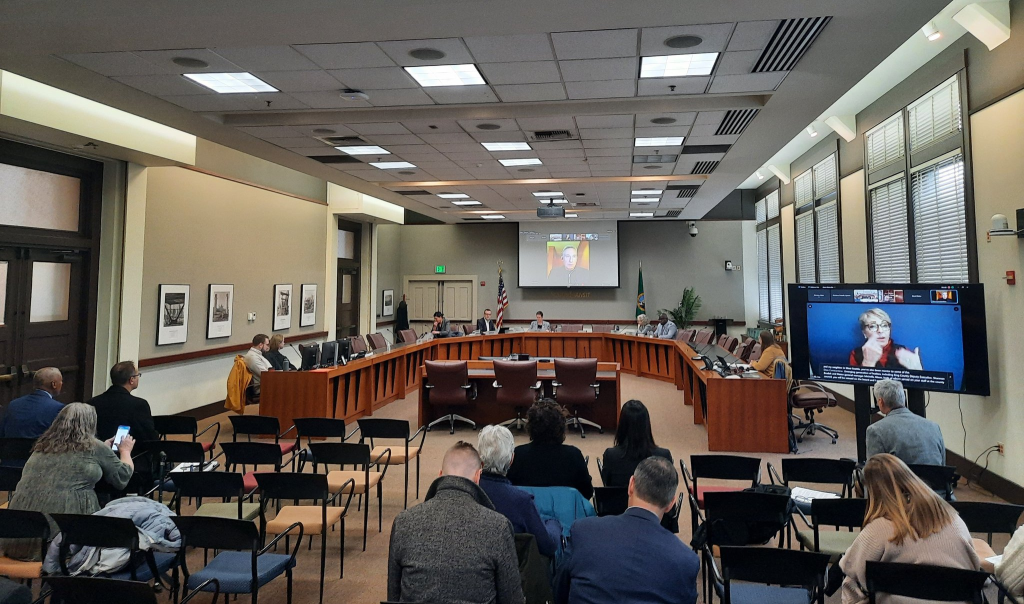
Twice picked as interim SDOT director, Sparrman hopes to right the ship at Sound Transit.
The Sound Transit Board of Directors is tapping transportation industry veteran Goran Sparrman to step into the role as interim CEO in the wake of outgoing CEO Julie Timm’s departure, set to officially take place at the end of this week. While currently a vice president at engineering firm HTNB, Sparrman has experience jumping into interim agency leadership positions locally.
In 2013, he was elevated from within the Seattle Department of Transportation (SDOT) to interim director when incoming Mayor Ed Murray fired Mike McGinn’s SDOT Director Peter Hahn. In 2017, when incoming Mayor Jenny Durkan fired Murray’s hire for the role, Scott Kubly, it was again Sparrman who filled in for a full year, guiding the agency through a tumultuous time as it mothballed the Center City Connector streetcar project and scaled back Move Seattle Levy promises.
Sparrman characterized streetcar project management as poor and said some SDOT staff have been reassigned but declined to say who, including in a follow up that asked pointblank if Transit and Mobility Director Andrew Glass-Hastings had been reassigned. #SeattleStreetcar
— The Urbanist (@UrbanistOrg) April 2, 2018
Sparrman comes to Sound Transit directly from the HNTB Corporation’s regional office in Bellevue, where he was working as a business development director and vice president. HNTB is currently engaged with Sound Transit on a number of active contracts, including a $320 million contract for environmental and design work on the West Seattle and Ballard Link light rail extensions. In December, the board increased that contract by $850,000 in order to study a potential new location for a future South Lake Union station near Seattle Center, after concerns about traffic impacts and utility relocation prompted additional scrutiny on the options that had been on the table.
While this interim appointment highlights the revolving door between the public sector and the world of transportation consulting firms, Sparrman is hardly the only one using that door. Sound Transit’s current chief system quality officer, Moises Gutierrez, had previously served as the agency’s executive director of portfolio services, but in the intervening time held a post at civil engineering firm Mott MacDonald as “strategic transit leader.” In mid-2023, after Gutierrez had rejoined the agency, Sound Transit approved a $20 million contract with Mott MacDonald to complete design and engineering work on its Operations and Maintenance Facility (OMF) South project. In December, Sound Transit revealed OMF South was headed toward massive cost overruns, which could delay the timeline for extending light rail to Tacoma.
The Sound Transit board will officially appoint Sparrman on Thursday, when they meet for a special meeting. That meeting will be the first full board meeting held in 2024, with four new boardmembers potentially stepping in to replace elected officials that left office at the end of 2023. King County Executive Dow Constantine has already announced his picks for three new members: King County Councilmember Girmay Zahilay, Redmond Mayor Angela Birney, and Seattle Councilmember Dan Strauss. The fourth appointment, replacing University Place Councilmember Kent Keel, is Pierce County Executive Bruce Dammeier’s to make.
Sparrman is being hired on a one-year contract, though he may end up leaving early if the board is able to find a permanent CEO. If recent CEO searches are any indication, the process will likely be kept heavily under wraps. The agency declined to release a list of finalists who were considered for CEO but lost out to Julie Timm for the job in 2022.
Ultimately, the board needs to find a CEO with significant experience steering megaprojects and hiring and empowering a team to manage the myriad of projects in the agency’s portfolio, a task that Sound Transit’s technical advisory group continues to give current leadership low marks on. After Timm lasted just 16 months on the job, Sound Transit is at risk of falling into a pattern of upheaval — perhaps even of using the CEO as a scapegoat for broader problems, as Robert Cruickshank argued in an op-ed in The Urbanist.
As temporary CEO, Sparrman won’t have as much leverage behind him as a permanent CEO would. It will fall to him to placate a variety of different advocacy pushes from boardmembers as the agency works toward opening two major light rail extensions in 2024. Brooke Belman, a 20-year veteran of Sound Transit who was last tapped to fill in as interim CEO two years ago, recently left her role as deputy CEO, underscoring the need for Sparrman to bring on some seasoned personnel.

Praise from board leadership was effusive with this week’s announcement.
“Goran is well-respected for his skill and knowledge in transportation and infrastructure projects,” Sound Transit Vice Chair and Snohomish County Executive Dave Somers said in a statement. “He’s a trusted regional leader who would bring a steady hand to an agency with which he is already familiar.”
Sound Transit board chair Dow Constantine said that Sparrman possesses a “unique skillset” to be able to step in as CEO.
Before working in central Puget Sound, Sparrman served as the head of the Bureau of Traffic Management in Portland, Oregon, under transportation commissioner Earl Blumenauer, where he worked on the city’s 1996 Bicycle Master Plan, which led to a doubling of the city’s bike network.
After leaving Portland, Sparrman served as Bellevue’s transportation director from 1998 to 2011, during which time the city completed its largest highway expansion since I-405 was completed 40 years earlier, when it enlarged three interchanges, increasing traffic capacity by 25% and adding space for high-occupancy vehicle (HOV) lanes. Two-thirds of the funding for those improvements came from Sound Transit.
In picking their new captain, Sound Transit may have found a steady hand, but what’s less clear is whether agency leadership has agreed on the ultimate destination and how to put a permanent team into place.
Ryan Packer has been writing for The Urbanist since 2015, and currently reports full-time as Contributing Editor. Their beats are transportation, land use, public space, traffic safety, and obscure community meetings. Packer has also reported for other regional outlets including BikePortland, Seattle Met, and PubliCola. They live in the Capitol Hill neighborhood of Seattle.

